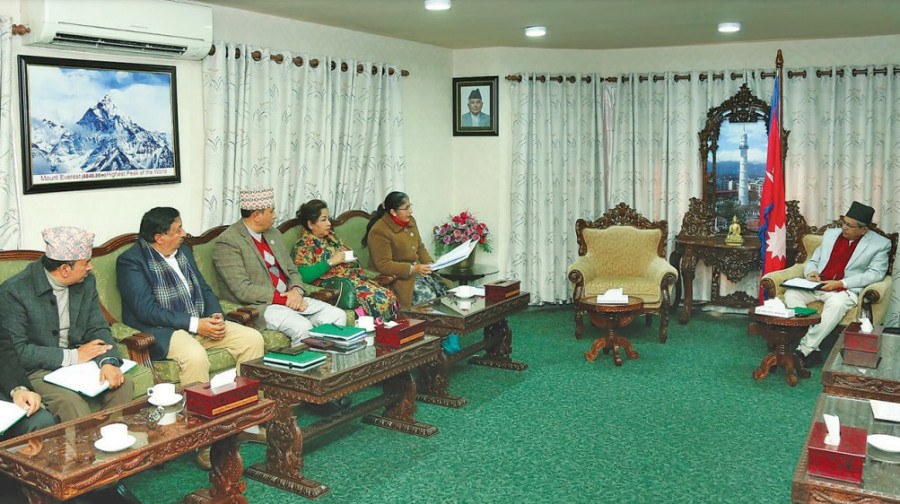National
Speaker alerts House panels against work duplication
Multiple committees probing the same issue and releasing clashing directives has become a pattern.
Binod Ghimire
Duplication of work among parliamentary committees is common in Nepal. Two or even more such committees investigating a single incident and passing contradictory directives have been reported on multiple occasions.
Currently, four different House panels are probing the recent buyout of Ncell, a multinational telecom service provider. This has not just affected effective investigation of the issue, but also increased the likelihood of mutually conflicting directives coming from the committees. Amid the fear, Speaker Devraj Ghimire asked the chairpersons of the committees in the House of Representatives to ensure there is no such duplication in the days ahead.
During a meeting with the chairpersons of parliamentary committees on Sunday, Ghimire said, “You coordinate among yourself and decide which committee oversees what issues. If you fail, I can intervene, but only at your request.” He also said it would be a waste of time and money for multiple committees to investigate a single issue.
The House committees, also called mini-parliaments, have authority to keep the government agencies under surveillance. Parliamentary Regulations specify which committee can scrutinise what government agencies. However, there are also cross cutting issues that multiple House committees can look into.
The chairpersons of the different House committees say they also are equally worried about the duplication of work among them. Ram Hari Khatiwada, chair of the State Affairs and Good Governance Committee, said he had raised the issue about the possibility of work duplication among committees. “Taking the case of Ncell as reference, I had said we need to find a way to address the overlapping of tasks,” he said.
On December 1, Axiata announced that it had entered into an unconditional sale and purchase agreement (SPA) with Spectrlite UK Limited to sell Reynolds Holding Limited, which owns approximately 80 percent equity stake in the Nepal-based Ncell Axiata Limited.
Spectrlite UK, registered in the United Kingdom in September this year, is under the ownership of Satish Lal Acharya, a man of Nepali origin currently based in Singapore. Sunivera Capital Venture, owned by his wife Bhavana Singh Shrestha, has another 20 percent stake in Ncell.
The State Affairs Committee took up the issue first. Then joined the Public Accounts Committee. The Finance Committee became the third panel to jump in followed by the Education, Health and the Information Technology Committee.
The Regulations allow two or more House committees to hold joint meetings and conduct joint investigation in cases of common concern. Though there had been such practice in the past, of late such joint meetings have not been held.
Shekhar Adhikari, a press advisor to Ghimire, said the Speaker emphasised the idea of each committee focussing on a single issue rather than holding joint meetings. “The Speaker wants to see the House committees working effectively. Two or more committees dealing with one issue will only complicate things,” he said.
On several instances in the past, two or more House panels have intervened in the same case of public concern. The conclusions of their studies are not uniform and often contradictory.
In early 2017, there was a major dispute over whether Ncell should get a licence to start 4G internet. The Public Accounts Committee had directed the Ministry of Information and Communications and the Nepal Telecommunications Authority not to allow the telecom company to introduce 4G and other services until it pays the capital gains tax (CGT).
The Development Committee and the Finance Committee of the House too intervened in the matter. While the Finance Committee didn’t have a clear position on the issue, the Development Committee cleared the way for the licence, contrary to the directives from the Public Accounts Committee.
A meeting of the Development Committee on April 16, 2017 had directed the government not to bar Ncell from rolling out 4G, stating that it is against the right of consumers to get to use the new technology.
Based on this directive, Nepal Telecommunications Authority cleared the way for Ncell to launch the new internet service. As the telecom authority’s decision to allow Ncell to roll out the service was based on a House committee’s directives, other committees and agencies couldn’t stop it.
Experts on parliamentary affairs say it is a responsibility as well as the prerogative of the Speaker to ensure that the House committees function effectively. “Duplication of work among the House committees has been a problem. If the Speaker wants, he can resolve it,” Som Bahadur Thapa, a former secretary at the Parliament Secretariat, told the Post. “Ghimire has taken the right initiative. Let’s see whether it works.”




 10.12°C Kathmandu
10.12°C Kathmandu















